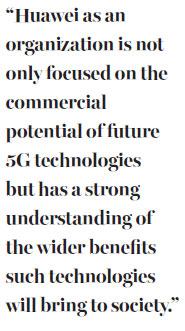Progress commitment second to none
Updated: 2016-11-04 07:22
By Harvey Morris(China Daily Europe)
|
|||||||||
Impressed UK academics say their Chinese partner is ahead of the curve on 5G innovation
China's Huawei has demonstrated its ability to "think ahead of the curve" in the course of a unique multinational collaboration that is pushing the frontiers of a fifth generation of telecommunications technology and the so-called internet of things.
This is the view of Professor Rahim Tafazolli, director of the 5G Innovation Centre, or 5GIC, at Britain's Surrey University, which opened a year ago with Huawei as one of 11 founding companies. Huawei equipment is at the heart of a unique test bed that connects with networks, cloud and supercomputing facilities of Vodafone, BT, EE and Fujitsu.
According to Tafazolli: "The early vision behind 5GIC came from discussions with senior management of Vodafone and Telefonica. But then a high-level meeting with a Huawei board member crystallized how that vision could be implemented in practice."
He credited the professional energy and commitment of Huawei's technical experts with the fact that the project met its target launch in September 2015.
Tafazolli's view was echoed by Gerry Foster, the center's 5G architect, who is tasked with designing and implementing its state-of-the-art test bed. Foster and his team spent months working with Huawei experts from the UK, Europe and China to meet the demanding technical specifications.
"The commitment of Huawei technical staff from the most senior to junior levels is second to none," he says.
"Huawei teams worked around the clock in collaboration with 5GIC academics and technical support staff, as well as with our other major 5GIC telecommunications members such as Vodafone and content providers such as the BBC," Foster says. "Our success really has been the result of an international team effort."

Professor Max Lu, president and vice-chancellor of Surrey University, says the relationship with Huawei exemplified his institution's commitment to strengthening international collaboration.
"Huawei as an organization is not only focused on the commercial potential of future 5G technologies but has a strong understanding of the wider benefits such technologies will bring to society," Lu says.
In that context, the center recently launched a program with the UK's state-run National Health Service to use the internet of things and 5G technologies to help provide better healthcare monitoring for the aged and infirm living at home. Up to 300 volunteers will be recruited to try out the technology in a realistic home environment.
Just a year after the university's unique 4-square-kilometer test bed was inaugurated, work is already progressing in cooperation with Huawei to upgrade its radio apparatus to provide greater speed and capacity. The test bed uses state-of-the-art Huawei equipment to provide an advanced 4G architecture that is gradually being developed on-site toward a full 5G standard.
Huawei researchers work off-campus in collaboration with the 175 dedicated researchers at the Surrey site. High-level contacts are maintained at director and board level.
Keith Robson, chief operating officer at the Surrey center, says Huawei was a particularly strong exponent of the vision shared by the center's corporate partners underlining "passion and commitment to the fundamental vision for 5GIC as the driving factor for the emerging future global digital economy".
The author is a senior media consultant for China Daily UK.
(China Daily European Weekly 11/04/2016 page8)
Today's Top News
High Court rules against government over Brexit
Court to instruct how to trigger formal EU exit
Premier emphasizes fight against terror
Italian authorities vow to rebuild earthquake-hit areas
Li arrives in Kyrgyzstan for visit, SCO meeting
Xi affirms one-China policy
France to begin moving migrant minors from Calais
Red Arrows flying high for first China display
Hot Topics
Lunar probe , China growth forecasts, Emission rules get tougher, China seen through 'colored lens', International board,
Editor's Picks

|

|

|

|

|

|







